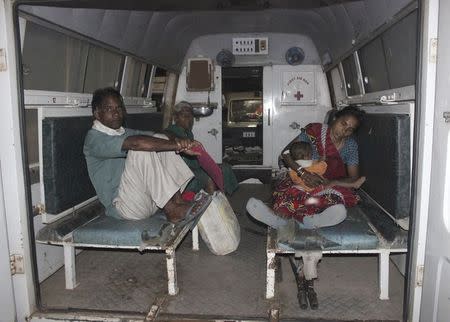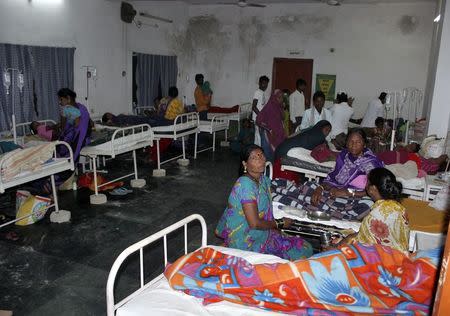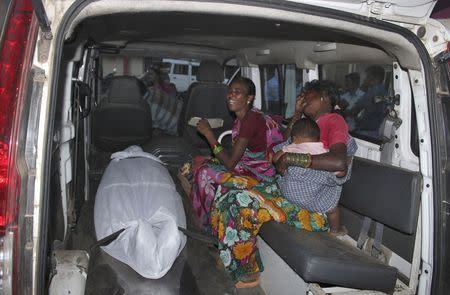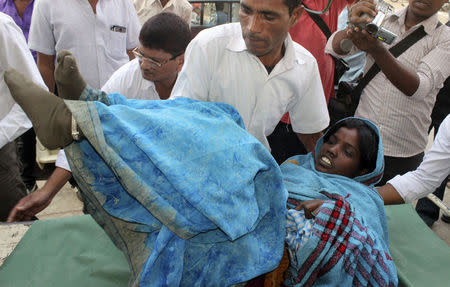At least a dozen women dead after Chhattisgarh sterilisation camps
By Aditya Kalra RAIPUR India (Reuters) - Nem Bai was told getting a tubectomy would be an easy process -that she'd be home by sunset, a few hundred rupees richer and back to work in the fields within two days. Instead, the 35-year-old mother-of-five was incapacitated within hours of the surgery at a mass sterilisation camp in Chhattisgarh on Saturday, her widower told Reuters. She was one of at least 12 women who have died since. "The entire night she was in tremendous pain," said Ramavtar Suryavanshi, while waiting in his village for his wife's body to be delivered from the hospital. By early morning, when Suryavanshi rushed Bai to a private hospital nearby, his wife was unable to speak. Within 20 minutes of being admitted to intensive care, she was dead. Scores more remain in hospital and several are critically ill after the operations performed on Saturday by a doctor accused of using rusty equipment in a dirty operating room, highlighting dangers in the world's largest surgical contraception programme. Two days later, another camp was held in the same Bilaspur district of Chhattisgarh. One woman died and more than a dozen fell ill with shock and vomiting, senior police officer Sonmani Borah said. The survivors from the two camps are spread between several clinics and there was confusion among officials over exactly how many women had died. One senior local official put the toll at 13, while others said it was 12. POPULATION GROWTH R.K. Gupta, an experienced doctor, performed more than 80 surgeries on Saturday, police say. A different doctor carried out the operations at the second camp, said Pratap Singh, commissioner of Chhattisgarh's Department of Health and Family Welfare. Such camps are held regularly as part of a long-running effort to control population growth. The cause of the deaths was not clear, but officials said victims showed signs of toxic shock, possibly because of dirty equipment or contaminated medicines. A hospital official said that some of survivors may be suffering kidney problems. "Preliminary reports show that the medicines administered were spurious and also the equipment used was rusted," senior local government official Siddharth Komal Singh Pardeshi told Reuters. Gupta's mass sterilisation took less than three hours with the help of two assistants working in a dirty, abandoned private hospital, officials said, and contravened guidelines to limit such operations to 30 a day. A seven-member team of doctors from New Delhi arrived in the district on Wednesday to investigate what went wrong, and the local government registered with the police a case of causing death by negligence against Gupta. Local media said Gupta blamed medicine the women were later given and denied making mistakes. He could not be reached by Reuters for comment. STATE OF SHOCK Many of the women were paid 1,400 rupees ($23) for the surgery, officials said. Health workers also received smaller payments for bringing women to the camp. "I would have been happier if they gave her the right treatment instead of giving her the money," said Suryavanshi, the widower. His youngest child is three months old, and was breast fed by Bai. He said health workers told his wife the procedure was safe and that thousands of women undergo the operation. Sterilisation is the most popular form of birth control in India. Encouraged by cash incentives, about 4 million people a year undergo surgery. Almost all are women. In Chhattisgarh, one of India's poorest states, the government had a target to carry out 165,000 female sterilisations and 26,000 male sterilisations in 2013-14, according to government documents. Some members of India's medical establishment and activists say targets make the sterilisation programme coercive. Investigating officer S.N. Shukla said all the women who were operated on Saturday had signed written consent. That is in line with national standards that also say consent should be not obtained under coercion or while the patient is sedated. Tubectomies are considered major surgeries, but doctors often exceed limits. Before guidelines were set there were reports of doctors performing 200 surgeries a day, said Suneeta Mittal, head of gynaecology at Fortis Memorial Research Institute near New Delhi. Operations at the camps are conducted in minutes, with little time to maintain hygiene. Nearly 600 deaths were reported between 2009 and 2012, according to the government. The deaths are an embarrassment for Prime Minister Narendra Modi, whose political party rules in Chhattisgarh. He has vowed to reform India's health system. Modi expressed concern over the tragedy on Tuesday. (1 US dollar = 61.4900 Indian rupee) (Additional reporting by Rupam Jain Nair and Krista Mahr in New Delhi and Jatindra Dash in Bhubaneswar; Writing by Krista Mahr; Editing by Frank Jack Daniel and Alex Richardson)

 Yahoo News
Yahoo News 



